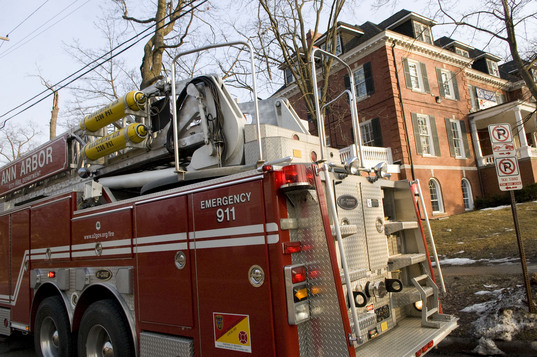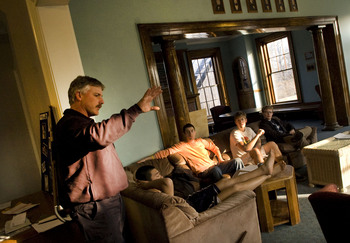Surprise fire alarms used to test evacuation methods at University of Michigan fraternities, sororities

An Ann Arbor fire truck is shown outside the Phi Delta Theta house Wednesday. Tom Perkins | For AnnArbor.com
At the sound of the fire alarm, the fraternity house cleared out within 40 seconds.
Half its occupants fled to the rear of the large home, and a small group gathered out front as an Ann Arbor Fire Department truck rolled up, lights flashing and sirens blaring.
Their evacuation method was exactly what Jim Rampton, community disaster education coordinator for the Red Cross, cautioned the residents against doing in the event of a real fire.Â
In this case, it was a surprise fire simulation being used to test the fire safety preparedness of some of the University of Michigan fraternity and sorority houses in the city.
The new initiative is a collaboration between the Washtenaw County Red Cross chapter, Ann Arbor Fire Department and U-M’s Greek Life organization. The purpose is to educate fraternity and sorority houses on the necessity for fire evacuation procedures and protocol.
Rampton used it as a lesson to inform the Delta Phi Theta members of the correct way to evacuate a burning house.
“If you take one thing away from this, it’s have a designated gathering spot out front where you all can account for one another,” Rampton told the roughly 26 residents.
Rampton explained fraternities and sororities are particularly at risk because so many students live in a small area. At Phi Delta Theta, 26 students live in 12 rooms, and Rampton added many of them are living on their own for the first time.
Rampton also pointed out the University of Michigan has the oldest and one of the largest Greek networks, and many of the houses are more than 100 years old. That means they’re prone to burn quicker with all the wood and insulation inside.

Ann Arbor Fire Captain Jim Budd speaks to Phi Delta Theta residents about fire safety. Tom Perkins | For AnnArbor.com
“Some of these houses are very flammable,” he said. “What would normally take a couple minutes to burn would take a couple seconds instead.”
Rampton said Greek houses differs from dorms, which are typically better regulated by the university. He called the simulations an effective tool for preventing a tragedy.
“It’s an opportunity for some outreach, especially with a group of students that are high risk,” he said. “It’s a really good chance and way to get them thinking some of these things.”
The Washtenaw County Red Cross chapter and city Fire Department are arranging simulations throughout the Greek community with only the house president aware, leaving the others to suspect it's a true emergency. To add to the authenticity, an AAFD truck rolls up, along with a Red Cross emergency vehicle.
Once the firefighters are out of the truck, and the residents are informed about what’s taking place, they all meet inside to discuss what happened and how to improve evacuations.
Rampton said he hasn’t been particularly encouraged with the reactions thus far, but is optimistic the initiative will improve the situation.
“Unfortunately, from what I’ve seen so far and from the responses that I’ve gotten, only one house actually has a plan,” he said. “Some are so limited in their knowledge that they have no idea of what to do, which is why this is helpful - they’re getting a taste of what they should expect in real life situation.”
In the case of Phi Delta Theta, at the corner of Washtenaw and South University avenues, the students' reaction to the fire alarm was both positive and negative.
While the fire alarm and fire extinguishers had been inspected by the fire marshal three months earlier, not everyone had been properly trained on how to use them.
More importantly, the house didn't have an evacuation plan or system for accounting for its occupants.
“We hadn’t really thought about it before, but that’s one of the things we can do now,” house president Tom Hardenbergh said, holding up a packet containing Red Cross suggestions on improving evacuation procedures and statistics on fires in university homes.
Hardenbergh added he was pleased with how quickly everyone reacted and gathered in groups, but believes it can be accomplished in a more orderly fashion.
“We know everyone has a sense of what to do, but we were not as organized as we need to be,” he said, adding that developing a plan will be placed at the top of the priority list.
Ann Arbor Fire Captain Jim Budd also made several recommendations. He pointed out the fire doors meant to prevent flames from spreading from room-to-room were propped open.
He also said if an emergency occurs, house officials should clear the building immediately and have a sober representative work with fire officials, which he said has presented problems on previous calls to fraternities and sororities.
“What I ask from you gentleman is that you treat firefighters with respect,” he said.
In 2008, a fire at a fraternity house near campus gutted the historic home - but it was during the summer, so few people were living there at the time. No one was injured.
“That was what spurred on this idea - looking at those pictures of that house,” Rampton said.
FEMA statistics show there were 3,800 university housing fires between 2005 and 2007. Of confined fires, roughly 80 percent are cooking related. Intentionally set fires, open flames and unintentional fires comprise the bulk of uncontained fires.
Tom Perkins is a freelance writer for AnnArbor.com. Reach the news desk at news@annarbor.com or 734-623-2530.


Comments
Griffen
Tue, Mar 16, 2010 : 8:02 a.m.
@ in4mation, your wife's "fraternity"? You mean Sorority, right?
Tom Perkins
Fri, Mar 12, 2010 : 4:54 p.m.
TruthInNews, The Red Cross provided several times and houses to choose from. I opted to tag along on the Delta Phi Theta run because it best fit my schedule. Fraternities do not "arrange" my stories for me. Tom
TruthInNews
Thu, Mar 11, 2010 : 11:55 p.m.
I am an alum of that house and can say I am impressed they all actually came out. Most students just ignore the alarms. Especially in the dorms. One of the members on the PhiDelt board is real tight with the building code people, so I am guessing he arranged for this article.
Tom Perkins
Thu, Mar 11, 2010 : 10:41 p.m.
Urban Sombrero, How someone gets out of the house isn't the issue, it's gathering in one spot after evacuation to make accounting for everyone quicker and easier.
John of Saline
Thu, Mar 11, 2010 : 9:26 p.m.
Does South Quad still get false fire alarms all the time?
81wolverine
Thu, Mar 11, 2010 : 9:12 p.m.
I lived for 3 years in a fraternity house very close by to the Phi Delta Theta house. So I know a little about the potential fire hazards in Greek houses. I think this is a great idea for the fire department to carry out. The fire inspectors always have a difficult job to do - make sure it's safe for people living in fraternities and sororities, while realizing the realities of a group with limited funds trying to maintain a house built in the early 1900's. I feel they always did a good job of striking that balance. This program is an improvement which will help lower the risk of fire.
Urban Sombrero
Thu, Mar 11, 2010 : 7:23 p.m.
Why should it matter if they go out the front or the back? As long as they all get out, right?
Lokalisierung
Thu, Mar 11, 2010 : 5:35 p.m.
@ Eep - Yep looks like you were right and I was wrong. Fair enough, apologies.
Eep
Thu, Mar 11, 2010 : 5:16 p.m.
@Loka... go ahead and call them, they'll come: http://a2gov.org/government/safetyservices/Fire/Pages/ExitDrillsintheHome.aspx
Lokalisierung
Thu, Mar 11, 2010 : 5:03 p.m.
"They pay property taxes to the city, just like any other private residence." Good point. I'm calling to set up getting a truck over to my house to work out my escape route for the family.
John of Saline
Thu, Mar 11, 2010 : 4:36 p.m.
We were told by the maintenance guys in Mosher-Jordan to get out quick if there was a fire; they thought the older building was likely to allow a fire to spread fast.
Eep
Thu, Mar 11, 2010 : 4:21 p.m.
Uhmmm.. fraternity and sorority houses are private residences. They pay property taxes to the city, just like any other private residence. They aren't owned by the University. And by the way, the State of Michigan pays the City of Ann Arbor close to one million dollars per year for providing fire department services to the University - but you'll hardly ever hear anyone acknowledge this fact.
Lokalisierung
Thu, Mar 11, 2010 : 4:02 p.m.
I think we're refering to the AAFD.
stevek
Thu, Mar 11, 2010 : 3:58 p.m.
It is free. All the assistance the American Red Cross provides is free.
Lokalisierung
Thu, Mar 11, 2010 : 3:10 p.m.
Good to see the University of Michigan Fire Department is getting the students ready for these possible emergancies. Hey wait a minute....
Griffen
Thu, Mar 11, 2010 : 12:32 p.m.
Are they going to do surprise evacuation drills at St. Andrews Church and the Delonis Center as well? I sure hope so!